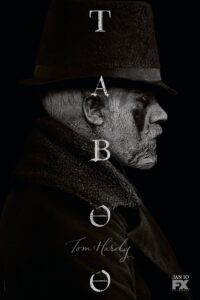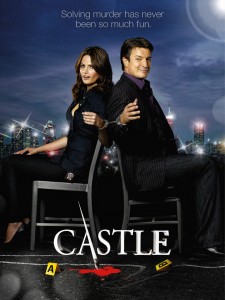In my experience, writing a good story is like baking a cake.
You have to measure each ingredient carefully. You have to know what things taste good together and what to leave out. Put too much liquid and it won’t firm up. Don’t put enough, the cake is dry. Add too much sugar and it’s inedible. Don’t add enough and it’s bland and tasteless.
Finally, after you have a good story, you add your icing. For novels, icing can be the worldbuilding aspects, extra juicy scenes to pander to the fans, or any manner of things. In television, however, I would equate the icing to the acting and atmosphere of a story.
FX’s mini-series Taboo is like a dry cake with excellent frosting.
Naturally, spoilers ahead.
Unfortunately, what I believe happens in instances like Taboo is that the writers got so wrapped up in the “mystery” of the show that they just flat-out refused to tell a story the way that people have been doing it for thousands of years, because for some reason, they thought they knew better. We’ve all seen shows, movies, or books of the like, where it’s so clear that the author wants to lead you around by the nose and never see a twist coming that they actually fail storytelling in general.
You see, Taboo has a terribly interesting premise, and it has strong dialogue delivered by an incredibly talented cast. I fully admit that I am a Tom Hardy fangirl, but it’s true that I gave this show a chance because it had the potential to be unlike anything else on network television these days. Hell, FX is one of my favorite channels for that reason. They like to take risks and explore the worlds outside of the boring lineup of every other channel with its shows only about doctors, lawyers, or cops. Furthermore, the cinematography is Emmy-worthy, and that’s saying something considering the show is set in Crapsack World 1800’s where everything is dirty, cold, wet, and diseased.
Still, this is what happens sometimes when you get big name directors like Ridley Scott who are so concerned with making something unsolvable that they lose the entire reason why we sat down to watch Taboo in the first place.
Let’s start with the big man himself, James Keziah Delaney. Is his part well-acted? Absolutely. Tom’s using his A-game and he’s given us a heavy, disturbing, intriguing performance as Delaney, who is just as batshit insane as a man can possibly get, and is so far into the antagonist role that you could easily argue he is a villain protagonist. Over the course of the show, we really are not given much in the way of redeeming qualities. At the most, we see he has a slight fondness for the madam’s daughter Winter and he has a slight attachment for his father’s servant Brace, but he is portrayed as basically a step below full on evil. He takes Anti-Hero to a whole new level, and it’s the first mistake that the show made: you cannot root for a man who is almost completely aligned with the villain, and so you never grow attached to him, therefore meaning that his fate is ultimately pointless.
As I mentioned before, basic storytelling means that you introduce a character, introduce their motivations, glance over their background in order to help the audience understand them, and then you put them on a journey.
Well, what the hell is James’ motivation? They never give us a full picture of who he is as a man, despite how much time we’ve spent with him. The writers threw us a few crumbs, but there is no payoff for who James Delaney is and why he does what he does. For example, most storytellers would make this a revenge story based around how the East India Company killed James’ father. We would assume as much, but we’re shown that James doesn’t have that much loyalty to his father and isn’t broken up at finding out he was killed for the Nootka land.
Well, maybe it’s about James’ mother, who was clearly a Native of some sort. Maybe she’s the reason he’s fighting the company to go to Nootka and maybe rediscover his roots. Nope. They never go into who his mother was, what she did, why she did it, how it affected him, or if he actually has any supernatural powers. They tease at it constantly and never address it, and it’s worse because it could have been one of the most interesting concepts of the entire show. Once more, it’s because the writers think it’s cool to keep the audience guessing and keep them in the dark, but all it does is make you impatient and frustrated that they’re jerking you around for the sake of jerking you around. James’ mother should have a larger impact on understanding who he is and where he came from, but ultimately she matters about as much as James’ father, which is not at all.
Over and over again, James makes decisions that can’t be predicted or absorbed by the audience because the show constantly holds us at arms’ length in order to deliver “ooh, aah, what a twist!” moments. I don’t know why they seem to think this is enough to keep our butts in the chairs. Without a reason to care or understand or sympathize with James, why should we stick around for a few cheap, paltry writing tricks?
Let’s say for argument’s sake that maybe it’s not about understanding James Delaney. Fine. What about Zilpha or Lorna? Nope. We’re not given any motivations for either of them. Zilpha is living under the greasy boot of her stupid abusive husband until the last two or three episodes. We don’t know how she ended up with him. We don’t know why she puts up with his abuse when she clearly has some kind of self-esteem and thoughts independent of him. Was her husband always an abusive creep or did James’ reappearance change him? Sure, it’s satisfying when she stabs his bitch ass and he dies knowing that she sent his sorry butt to the afterlife, but then the show immediately ruins it by letting her story unceremoniously end with suicide. What? Are you kidding me? Why did James doggedly pursue her, to the point where he was giving her wet dreams, and then just randomly drop her on her ass? They never explain why he just cut her off and then she just dies for no reason. What was the point of telling that story in the first place if there is no pay off?
Alright, then let’s focus on Lorna. Maybe she was meant to be the focus. Nope. No dice. Lorna shows up all proud and arrogant like she’s hot shit in a champagne glass, but she then proceeds to just take up space as the Token Vagina of the group. She contributes absolutely nothing to the story until the season finale when she exonerates James from the murder of Winter—which, by the way, no one was investigating and he was just stomping around London free as a bird in spite of this—but even then that became a moot point because James was escaping London altogether and Winter’s mother dies in the finale. Again, what was the point of this character? They never show us anything about her marriage to James’ father, if it was even legit, or if she knew all along that attaching herself to him would give her Nootka, or why she wanted Nootka to begin with considering she was just an actress. How could she sail to America and expect not to be instantly killed upon arriving? Or was she just going to sell Nootka to the highest bidder? We, as the audience, cannot answer any of these questions, and that is a huge sign that this story is sour.
There are so many points in this show where there is no pay off. It’s just sloppy. For example, we later see that James and Goddard did file the account of the Influence’s sinking and gave it to Chichester, but then James just murders Stuart Strange, who is the reason why Chichester wanted justice in the first place. Stuart is dead and therefore cannot pay for his crime in the justice system. Perhaps it means the destruction or at least the seizure of the East India Trading Company, but those two actions are at odds with each other in terms of the story. You could argue that it shows that James has at least some common decency, but since we still don’t know what’s going on inside his head, it’s not satisfying.
To me, Taboo could have been a delicious cake with delicious frosting, and instead, it is a dry cake with fantastic frosting. Most of the time, you want it to be bad frosting on a good cake because you can simply scrape the frosting off and eat the cake, but Taboo is at its core an unstable story wobbling because the cook was so busy trying to be Avant Garde that he just forgot the right ingredients and the right measurements.
I must admit that I’m not entirely sure if I’ll be back if FX orders another season. It’s extremely clear that the people in that writers’ room just want to dick around instead of doing their job and telling a story so that we care about the characters we’ve spent so much time with. I suppose I’ll have to mull it over and decide if it’s worth it for another go at an extremely overcooked cake with poor flavoring, but excellent frosting.
Maybe if Tom Hardy shares it with me…

